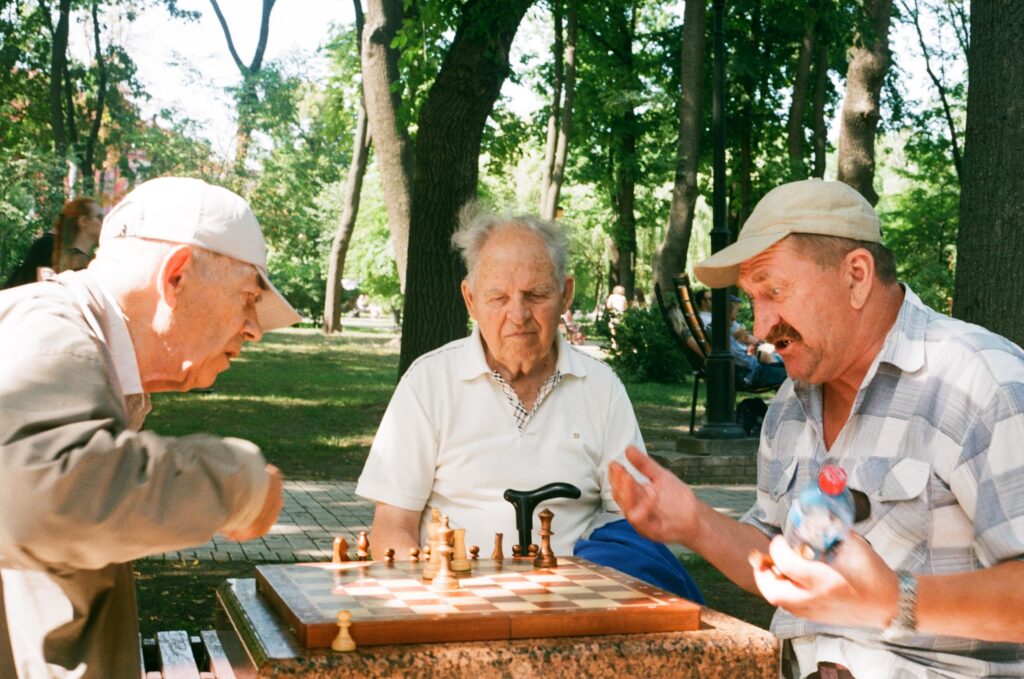Introduction
In a world that often celebrates the loud and social, it’s refreshing to see the quiet thinkers—the introverts—step into the light. Many believe that one’s social canvas is set in stone, yet a growing number are exploring the vibrant introvert to extrovert transition. This article peels back the layers on why staying connected with others isn’t just a nice-to-have, but a must-have as we age, and outlines five practical ways to weave this into one’s life. From the comfort of their own space, introverts can embark on a journey of transformation, challenging the notion that quietness is a permanent trait. 🌱✨

The Risks of Social Isolation in Senior Years
Before delving into the fabric of social connectivity, it’s crucial to consider the risks that come with social isolation, particularly in the senior years. It’s a silent tide that often creeps in unnoticed, distancing them from the vibrant interactions of life. Isolation isn’t just about feeling lonely; it can be a catalyst for a host of health issues, both mental and physical. Studies have shown that those who find themselves frequently alone tend to face higher risks of depression, anxiety, and even cognitive decline. The body, too, echoes this sentiment, with isolation being linked to increased blood pressure, heart disease, and a weakened immune system.
For introverts, the notion of pushing against their inherent tendencies to foster social ties can seem daunting. Yet, it’s a step that holds the key to not just surviving but thriving. The transformation doesn’t necessitate a complete personality overhaul; rather, it’s about finding the balance that allows for growth without losing one’s essence. Taking our introvert test can be a starting point, offering insights into where one falls on the social spectrum and providing tailored advice for gently expanding one’s social horizons.
As they say, knowledge is power, and understanding one’s current social skills is the first stride toward enhancement. Armed with this knowledge, introverts can navigate their path forward with confidence, armed with strategies that align with their core personality. The journey from a world of introspection to one of broader social landscapes is not about changing who you are but enriching the life you lead with the warmth of human connection. The risk of isolation is significant, but the steps to mitigate it are both achievable and rewarding, paving the way for a future rich with the colors of community and camaraderie.

Joining Clubs and Groups of Interest
Moving beyond the individual and into the realm of shared interests, joining clubs and groups presents a unique opportunity for introverts to kindle social connections in a structured environment. Clubs and interest groups offer a common ground, a pre-established mutual interest that eases the initial stages of conversation and interaction. For introverts, this can be a less intimidating entry into socialization, as the focus is on the shared passion rather than on them as individuals. Whether it’s a book club, a gardening group, or a local chess circle, these settings provide a natural buffer against the pressure of social performance, allowing for engagement at one’s own pace.
It’s here that the intro to extro community can serve as a beacon for those looking to expand their social skills. This community isn’t just a group of people; it’s a support system, a place where like-minded individuals can exchange ideas, experiences, and encouragement. The collective wisdom found within can be a powerful tool for introverts, offering a variety of perspectives on the socialization process that respects their boundaries while also pushing them to explore new horizons.
Within these groups, introverts can find not only camaraderie but also a platform for personal growth. By engaging in regular meetings and activities, they can practice and enhance their social skills in a controlled and friendly environment. The act of sharing ideas and collaborating on projects can bolster one’s confidence in social settings, making the act of reaching out less daunting. Furthermore, the reciprocity of support and understanding within these groups reinforces a sense of belonging and purpose, contributing to one’s overall well-being.
For the introverted adult, this method of social engagement capitalizes on their natural propensity for deep thought and focused interest, turning what might be a solitary pursuit into a shared journey. It’s about transforming solitary sparks of interest into a collective glow of interaction and connection.

Regularly Scheduled Family Time
Establishing regularly scheduled family time is a cornerstone in fortifying social bonds as one ages, and for introverts, it can be a comforting and familiar way to maintain social ties. Family gatherings are a tapestry of shared histories and commonalities, a safe harbor where introverts can be social in a setting that feels like an extension of their own being. These occasions provide a rhythm of interaction that can be anticipated and prepared for, reducing the stress of impromptu social encounters. It’s a time for introverts to engage in meaningful conversations, participate in group activities, or simply enjoy the company of loved ones in a quiet, supportive environment.
The beauty of family time lies in its adaptability; it can be as simple as a weekly meal, a game night, or a group video call for those separated by distance. This routine fosters a sense of security and belonging, reinforcing the familial bond and providing a regular dose of socialization that is both manageable and enjoyable for the introverted adult. In these moments, the pressure to perform is lifted, allowing for genuine interactions that are both nourishing and affirming.
Moreover, these gatherings serve as an avenue for multi-generational exchange, where wisdom, stories, and laughter are shared across the ages, enriching the social experience. For introverts especially, this can be a treasured time where they can both impart and gain insights, bolstering their social confidence in the wider world.
Yet, it’s important to note that family dynamics vary, and for some, these settings may come with their own set of challenges. That’s where the intro to extro roadmap comes into play, offering guidance and strategies to navigate family socials in a way that feels authentic and fulfilling. This guide stands apart, recognizing that each individual’s journey to improved sociability is unique, especially within the intricate dance of family relationships. It provides the tools to enhance one’s social presence in family gatherings, ensuring that these occasions are enriching and contribute positively to one’s social well-being.

Lifelong Learning and Education
Engagement in lifelong learning and education serves as a powerful conduit for adults, particularly introverts, to both enhance their knowledge and foster social connections. Adult education classes, workshops, and online courses offer more than just skill acquisition; they provide a platform for interaction with peers who share similar learning goals. For introverts, the structured nature of these educational settings can be particularly appealing, offering clear expectations and a focused environment for both learning and socializing.
In these learning spaces, introverts can engage with others through collaborative projects, group discussions, and study sessions. The shared pursuit of knowledge creates a common ground, allowing social interactions to flow more naturally around course content. This scenario minimizes the stress of socializing by providing a clear context for communication, making it less about personal exposure and more about mutual intellectual exploration.
Additionally, lifelong learning encourages a growth mindset, not only in the intellectual realm but also in the social domain. It challenges individuals to step outside their comfort zones, to ask questions, and to share insights, which can gradually build social confidence. For the introverted adult, who often thrives in contemplative and structured settings, educational pursuits can become a gateway to both personal and social enrichment.
What’s more, the benefits of such engagements extend beyond the classroom. The relationships formed in these educational settings can lead to networking opportunities, new friendships, and a broader social circle. These connections can further be nurtured through study groups or alumni networks, providing long-term social frameworks that extend the learning experience.
In embracing lifelong learning, introverts find a dual-edged sword that sharpens the mind and weaves a richer social tapestry. With each class, lecture, or seminar, they build not only their intellectual prowess but also their social repertoire, proving that the quest for knowledge can be both a personal journey and a shared venture.
Community Engagement and Volunteer Work
Community engagement and volunteer work present invaluable avenues for adults, especially introverts, to cultivate social skills while contributing meaningfully to society. Volunteerism acts as a bridge between personal solitude and community service, offering a structured and purpose-driven way to interact with others. For those who naturally shy away from the spotlight, community work allows them to connect with individuals and groups through shared goals and collective efforts, rather than the pressure of socializing for its own sake.
Introverts often find a profound sense of fulfillment in acts of service, where the focus shifts from the self to the community. This shift in perspective can alleviate the internal pressure they might feel in social situations, enabling them to engage with others more freely and authentically. The repetitive nature of volunteer work can also provide a comforting routine, while the diversity of tasks and roles available can cater to a wide range of interests and abilities, allowing introverts to find a niche where they feel most confident and effective.
Moreover, community involvement often requires coordination and teamwork, skills that are transferable to other areas of social life. Working alongside others towards a common cause can build trust and camaraderie, laying the foundation for strong social networks. The regular interaction with fellow volunteers, community members, and organizational staff can gradually enhance an introvert’s social toolkit, fostering skills such as empathy, cooperation, and communication.
In the realm of volunteer work, the social benefits are twofold: introverts can experience personal growth while their contributions positively impact those around them. The sense of achievement and community connection gained from this work reinforces the idea that one’s social abilities are not fixed but can expand and flourish through meaningful, outward-looking activities. Engaging in community service is not just about giving back; it’s about growing inwardly as well, as introverts navigate the social landscape in a way that feels genuine and rewarding.
Assertiveness Training: Balancing Confidence and Respect
Assertiveness training is an empowering tool for introverts looking to strike a balance between confidence and respect in their social interactions. Often misconstrued as aggression, true assertiveness is about expressing oneself effectively and standing up for one’s point of view, while also respecting the rights and beliefs of others. For introverts, mastering this skill can be particularly transformative, allowing them to voice their thoughts and needs without compromising their inherent tendency towards reflection and respect.
In the process of developing assertiveness, introverts learn to set boundaries, communicate desires, and negotiate interpersonal dynamics in a way that honors both their own values and those of the people they interact with. This training typically involves role-playing exercises, which provide a safe space for introverts to practice new behaviors and receive feedback in a controlled, supportive environment. It’s a step-by-step approach that builds confidence incrementally, ensuring that each new skill is integrated comfortably into their social repertoire.
Assertiveness training also teaches the importance of non-verbal communication, such as maintaining eye contact, using a firm yet pleasant tone, and adopting an open posture. These cues are essential for introverts, as they complement verbal communication and convey confidence without the need for extensive dialogue. By combining verbal assertiveness with non-verbal signals, introverts can communicate more powerfully, which in turn, can lead to more effective and satisfying social interactions.
Moreover, as introverts become more assertive, they often find that their social experiences become more positive. They’re able to engage in conversations more proactively, contribute ideas in group settings, and advocate for themselves when necessary. This newfound competence can have a profound impact on their personal and professional lives, leading to enhanced relationships and greater success in collaborative endeavors.
Assertiveness doesn’t require a loud voice; it requires a clear one. And for introverts, the journey to finding that voice can open up a new world of social possibilities, where they can interact with confidence and clarity while remaining true to their introspective nature.
The Ongoing Journey of Sociability in Aging
The ongoing journey of sociability in aging is not a straight path but a winding road filled with opportunities for growth and reflection, especially for introverts. As they navigate the later stages of life, the need for social connection remains as vital as ever, though the methods of achieving it may evolve. The beauty of this journey is that it’s never too late to enhance one’s social skills or to reap the rewards of deeper, more meaningful interactions.
For the introverted adult, this journey may involve finding new ways to engage with a world that is constantly changing. It may mean embracing new technologies to stay in touch with loved ones, finding comfort in the familiar cadence of regular family gatherings, or discovering the joy of meeting new people through community involvement. Each step, whether big or small, is a leap towards maintaining their relevance and presence in the social fabric of life.
This process of continuous social engagement also acts as a protective layer against the mental and emotional challenges that can accompany aging. By staying socially active, introverts can keep their minds sharp and spirits high, drawing on the collective energy of the communities they are part of. The relationships they foster and maintain can provide a sense of purpose and belonging, which in turn can have a profound impact on their overall well-being.
Ultimately, the goal is not to change the core of who they are but to allow their introverted qualities to flourish in a way that suits their changing lifestyle. It’s about adapting and integrating new social strategies that align with their values and needs. The ongoing journey of sociability in aging for an introvert is a testament to the resilience and adaptability of the human spirit, a reminder that the desire for connection transcends all ages and personality types. It is a celebration of the fact that, even in the quietest hearts, the need to connect and share life’s experiences is a flame that never truly goes out.
Conclusion
In conclusion, the path to enhanced sociability for introverted adults, particularly as they age, is not one of transformation into extroversion but one of adaptation and embrace of their intrinsic qualities. This journey, enriched by the deliberate practice of social skills and the mindful selection of social settings, allows for a harmonious balance between the need for solitude and the benefits of connection. Whether it’s through family, educational pursuits, volunteer work, or assertive communication, each step taken is a testament to the introvert’s capacity for growth and the human desire for community. As they continue to weave these threads into the tapestry of their lives, introverts not only enrich their own experiences but also contribute to the richness of the lives around them. The importance of staying social as we age is undeniable, and the strategies outlined here provide a roadmap that honors the introvert’s journey, ensuring it is as fulfilling as it is necessary.




